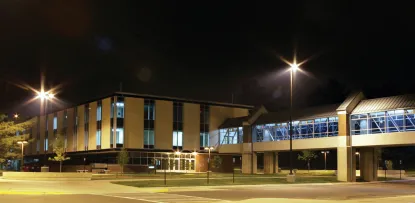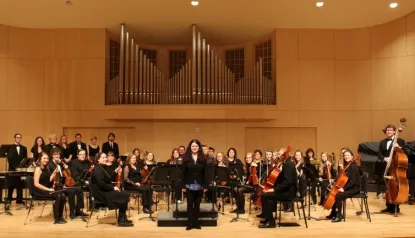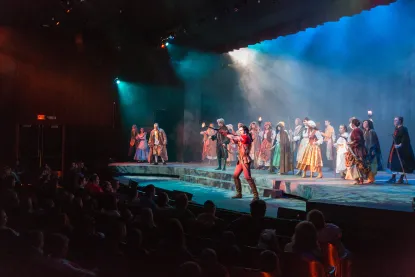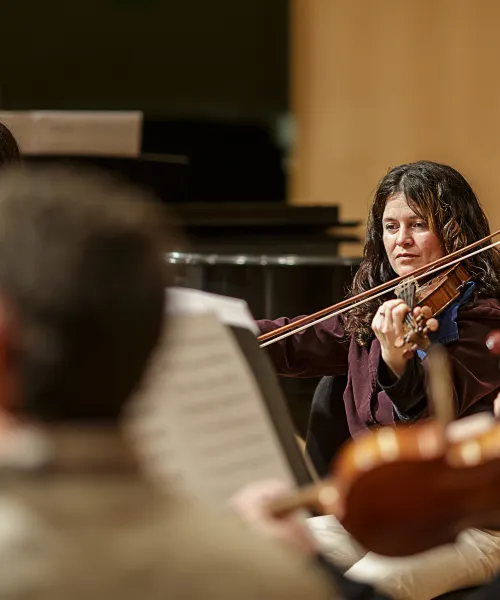
Thomas Fine Arts
The Thomas Fine Arts Building, or TFA as it is known on campus, is home to the School of Music, Theatre and Dance and the Communication and Media Studies Department. Offices for the Department of Music are located on the first floor just inside of the main entrance.
Music students will spend a lot of time here in classrooms and specialized facilities, including:
- 2 large rehearsal rooms (instrumental and choral)
- Percussion Ensemble Room
- Chamber Ensemble Room
- 12 faculty studios
- 28 practice rooms
- Piano Lab (16 stations)
- multiple classrooms
- Instrumental and Choral Libraries
- several dedicated instrument storage areas

Reynolds Recital Hall
Reynolds Recital Hall is used for all departmental recitals and concert performances. The 300-seat concert hall is one of the premiere performance venues in the state of Michigan. Architecturally and acoustically, the hall provides an unparalleled musical experience for both listeners and performers. In addition to its exquisite natural acoustics, the hall's interior convex walls include a system of draperies which may be opened or closed depending on the type of music or ensemble.
Located in the Hedgcock Student Services Building, Reynolds Hall houses two 9' and 7' Steinway grand pianos and a three-manual Walker digital organ with 77 equivalent pipe ranks. It is named in honor of Phyllis and Max Reynolds, generous patrons of the arts.

Forest Roberts Theatre
The Forest Roberts Theatre or FRT, is one of the finest university theaters in the country. It accommodates 515 people in a continental seating arrangement, an orchestra pit and has its own scene and electrics shops, as well as state of the art costume facilities and dressing rooms. It is connected to Thomas Fine Arts for convenient collaboration with Theatre and Dance programs and performances. Many music majors perform in mainstage shows, while others get invaluable hands-on experience in sound, lighting and arts management.

Equipment and Instruments
Instruments
- In addition to the two concert Steinway grands and Walker digital organ in the Reynolds Recital Hall, the department maintains about a dozen other fine quality grand pianos in rehearsal rooms, faculty studios, and piano major practice rooms. New Boston uprights are located in various music classrooms and other practice rooms. The class piano lab has Roland F150 digital pianos.
- A Roland Fantom G8 synthesizer/workstation and other synthesizers are used for performances.
- Percussion students study and perform on a full range of professional-level equipment including a new set of Adams timpani.
- The music education classroom lab is outfitted with classroom instruments of all kinds, including guitars, Orff instruments, auxiliary percussion, and hand chimes.
- For students enrolled in instrument classes, or for unusual instruments, the department has an excellent collection of top quality instruments from makers such as Selmer and Yamaha.
High Tech Music Instruction
Students link their mobile device to fully integrated MIDI workstations to complete assignments and master skills in ear training, theory, MIDI sequencing, digital audio production, music scanning and engraving and composition. Music classrooms are equipped with SmartBoard technology. Students are provided with the latest versions of advanced music software including Sonar (Cakewalk Pro Audio), Finale, Band in a Box, SmartMusic and SmartScore. McGamut software is used in aural training classes.
Practice Rooms
Private or semi-private Wenger practice suites are available to music students. Mobile device docking stations and a speaker system enable students to practice interactively using recordings, internet downloads, or other software. Beyond the 28 practice rooms, students have access to two Wenger V-Room practice suites. This technology enables users to change the acoustics of the room to simulate different performing environments, like 'virtual reality' for the musician. NMU is the only state university in Michigan to offer this innovation. Students also have access for the Reynolds Recital Hall for practicing.
